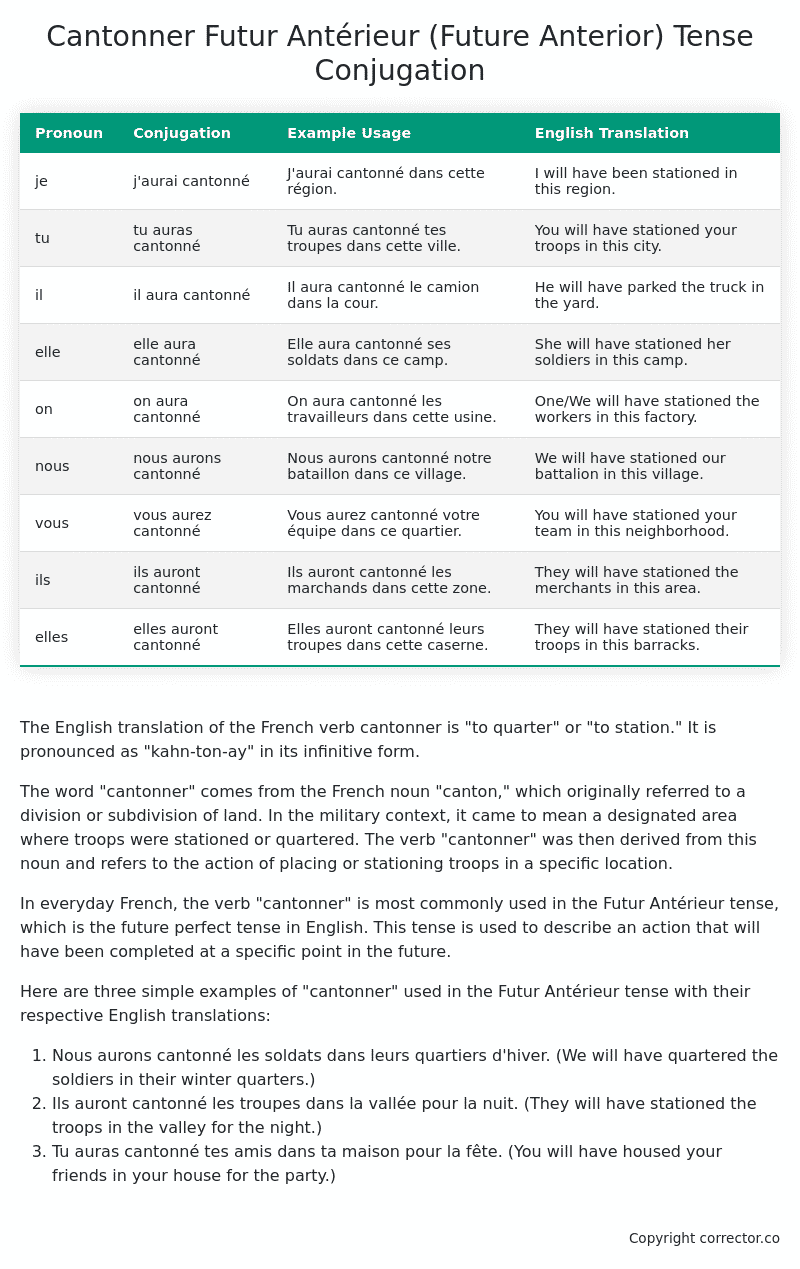Futur Antérieur (Future Anterior) Tense Conjugation of the French Verb cantonner
Introduction to the verb cantonner
The English translation of the French verb cantonner is “to quarter” or “to station.” It is pronounced as “kahn-ton-ay” in its infinitive form.
The word “cantonner” comes from the French noun “canton,” which originally referred to a division or subdivision of land. In the military context, it came to mean a designated area where troops were stationed or quartered. The verb “cantonner” was then derived from this noun and refers to the action of placing or stationing troops in a specific location.
In everyday French, the verb “cantonner” is most commonly used in the Futur Antérieur tense, which is the future perfect tense in English. This tense is used to describe an action that will have been completed at a specific point in the future.
Here are three simple examples of “cantonner” used in the Futur Antérieur tense with their respective English translations:
- Nous aurons cantonné les soldats dans leurs quartiers d’hiver. (We will have quartered the soldiers in their winter quarters.)
- Ils auront cantonné les troupes dans la vallée pour la nuit. (They will have stationed the troops in the valley for the night.)
- Tu auras cantonné tes amis dans ta maison pour la fête. (You will have housed your friends in your house for the party.)
Table of the Futur Antérieur (Future Anterior) Tense Conjugation of cantonner
| Pronoun | Conjugation | Example Usage | English Translation |
|---|---|---|---|
| je | j’aurai cantonné | J’aurai cantonné dans cette région. | I will have been stationed in this region. |
| tu | tu auras cantonné | Tu auras cantonné tes troupes dans cette ville. | You will have stationed your troops in this city. |
| il | il aura cantonné | Il aura cantonné le camion dans la cour. | He will have parked the truck in the yard. |
| elle | elle aura cantonné | Elle aura cantonné ses soldats dans ce camp. | She will have stationed her soldiers in this camp. |
| on | on aura cantonné | On aura cantonné les travailleurs dans cette usine. | One/We will have stationed the workers in this factory. |
| nous | nous aurons cantonné | Nous aurons cantonné notre bataillon dans ce village. | We will have stationed our battalion in this village. |
| vous | vous aurez cantonné | Vous aurez cantonné votre équipe dans ce quartier. | You will have stationed your team in this neighborhood. |
| ils | ils auront cantonné | Ils auront cantonné les marchands dans cette zone. | They will have stationed the merchants in this area. |
| elles | elles auront cantonné | Elles auront cantonné leurs troupes dans cette caserne. | They will have stationed their troops in this barracks. |
Other Conjugations for Cantonner.
Le Present (Present Tense) Conjugation of the French Verb cantonner
Imparfait (Imperfect) Tense Conjugation of the French Verb cantonner
Passé Simple (Simple Past) Tense Conjugation of the French Verb cantonner
Passé Composé (Present Perfect) Tense Conjugation of the French Verb cantonner
Futur Simple (Simple Future) Tense Conjugation of the French Verb cantonner
Futur Proche (Near Future) Tense Conjugation of the French Verb cantonner
Plus-que-parfait (Pluperfect) Tense Conjugation of the French Verb cantonner
Passé Antérieur (Past Anterior) Tense Conjugation of the French Verb cantonner
Futur Antérieur (Future Anterior) Tense Conjugation of the French Verb cantonner (this article)
Subjonctif Présent (Subjunctive Present) Tense Conjugation of the French Verb cantonner
Subjonctif Passé (Subjunctive Past) Tense Conjugation of the French Verb cantonner
Subjonctif Imparfait (Subjunctive Imperfect) Tense Conjugation of the French Verb cantonner
Subjonctif Plus-que-parfait (Subjunctive Pluperfect) Tense Conjugation of the French Verb cantonner
Conditionnel Présent (Conditional Present) Tense Conjugation of the French Verb cantonner
Conditionnel Passé (Conditional Past) Tense Conjugation of the French Verb cantonner
L’impératif Présent (Imperative Present) Tense Conjugation of the French Verb cantonner
L’infinitif Présent (Infinitive Present) Tense Conjugation of the French Verb cantonner
Struggling with French verbs or the language in general? Why not use our free French Grammar Checker – no registration required!
Get a FREE Download Study Sheet of this Conjugation 🔥
Simply right click the image below, click “save image” and get your free reference for the cantonner Futur Antérieur tense conjugation!

Cantonner – About the French Futur Antérieur (Future Anterior) Tense
Construction
Common Everyday Usage Patterns
Interactions with Other Tenses
For example
Summary
I hope you enjoyed this article on the verb cantonner. Still in a learning mood? Check out another TOTALLY random French verb conjugation!


